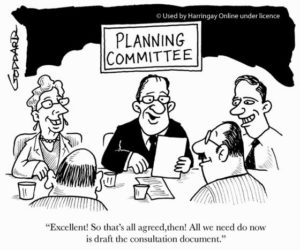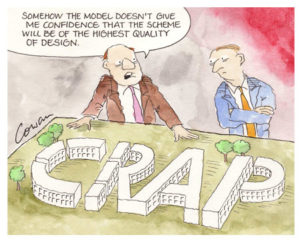


THE CURRENT SITUATION
The current Covid crisis has inevitably caused a major hiatus in dealing with lodged and new planning applications as HBC adjust to a new working environment. Nevertheless, the present system didn’t work as well as it could in normal times. We recognize that HBC Planning Department, in the best of times, is under-resourced and struggling to deal with applications in a timely manner. Post-Covid we cannot afford to return to the same beleaguered process whose protracted delays inflict unnecessary costs on applicants and deters inward investment. Given the will to change, improvements to the process are possible.
IMPROVING THE PROCESS
HUDG along with other professional institutes can offer practical help and support to HBC to assist them in improving the process. We set out below some changes that might benefit the system helping to speed up the process, improve community consultation and provide an opportunity for better design. Post-Covid a rapid response to future development opportunities is likely to be crucial to the economic recovery of the town.
The planning process also needs to accommodate improved community consultation. Too often consultation is left too late in the day and is often seen by the public as a token, “tick-box”, gesture.
PROPOSALS TO IMPROVE OUTCOMES FROM THE PLANNING PROCESS.
A good place to start is with a quote from “Planning and Design, Achieving Good Design Through The Planning Process”, Planning Officers Society (POS).
“By and large the public…expect local planning authorities (LPAs) to exert a strong influence on design…and…to ensure that the public interest is at the forefront of design considerations. This emphasis on good design is central to national planning policy…the POS encourages local planning authorities to put in place the necessary arrangements to ensure that they can meet the expectations of their local communities and achieve the very highest design standards…we recognise that for many (LPAs) this is a difficult challenge. For many years…authorities…were strongly discouraged from taking an…interest in design….Consequently procedures and skills…in design are missing from many planning departments.”
DESIGN REVIEW PANELS: are described more fully elsewhere (see Design), but the point here is that, with the abolition of in-house design departments, LPAs will never be able to employ the range and quality of expertise needed to help promote good design. Panels should be an attractive option for LPAs because of their independence and low cost (normally only expenses are paid).
FREE PRE-APPLICATION ENQUIRIES: charging for pre-app enquiries is a retro-grade step because it leads to a default position of applying cold and then negotiating or running to appeal. Neither delivers improved design. Initial pre-app discussions to test what might be an acceptable form of development ought to be free of charge and any defined parameters used to define subsequent discussions, which could be on a charged basis. On major schemes it is important that the community’s views are taken on board at this early pre-app stage.
TIMING: proposals for development must come forward early in the design process in order to check if the basic decisions, leading up to a concept, are correct. Designs which are too advanced become heavily invested in by client and designer such that suggested design errors tend to be adjusted rather than fundamentally re-assessed.
DESIGN CHAMPIONS: are described elsewhere (see Design), but important in terms of demonstrating LPA commitment to higher quality.
RECOGNITION/PROMOTION: the LPA, in collaboration with other national and local bodies, could identify exemplar projects in terms of application quality and finished product, and make local design awards.
AGENTS FORUM: these did exist locally, but are now no more, and only dealt with procedural matters; it would be easy to re-instate them and to open out the agenda to encompass design.
DESIGN GUIDES: prescriptive design guidance is notoriously difficult not least because policy by definition cannot be precise but because each design problem presents a different set of competing constraints. However, non-prescriptive design guides (such as that produced and used by Kent County Council for some years now) are helpful because they set out a clear process. And being able to see how the design was arrived at is all important.
PLANNING BRIEFS/GREATER PLANNING PRO-ACTIVITY: by its legislative nature the planning system is very supine/re-active. Up front investment by LPAs in producing planning briefs for sites, if well constructed, could encourage improved design and save resources further through the process. Appropriate skills are needed of course.
RECOGNISE WHAT CAN BE CONTROLLED: presently planning becomes too involved in detail which the planning system was not itself designed to deal with and few planners know much about, while the important analysis/synthesis component of design is ignored.
DESIGN SURGERIES: similar in some senses to Review Panels but could be more open and more locally focused events, perhaps once a month and involving one or two local architects and a planning officer, where site owners can come for very early advice on design and planning.
DEVELOPING A DIALOGUE WITH HASTINGS COUNCIL
Hastings deserves higher quality planning outcomes than are presently being delivered. On a more optimistic note, HBC recognise that their present design policies need improving, as they are clearly not working as well as they should.
As part of our overall objective to improve design standards the Group recognises that Hastings Council, and in particular the Planning Department, must be engaged in the debate to raise standards.
We have had several meetings in the past , both with Councillors (including Andrew Palmer Head of Planning and Housing) and Officers (most significantly Eleanor Evans, Planning Services Manager )to discuss two specific topics, which we feel HBC could put in hand at minimal cost.
Those meetings confirmed that the Council is considering setting up a Design Review Panel, as recommended in the new National Planning Policy, but as yet we have seen no positive moves to do so, nor has the Council taken up our offer to assist by liaising with the RIBA and local designers to help set up a panel.
The initial response on neighbourhood planning was far less encouraging. Despite it being a duty under the Localism Act to provide support for Neighbourhood Plans, the Council were not actively working towards this.
We are currently awaiting a reply to our latest letter to Andrew Palmer (13th June 2012), which offers a follow up meeting to discuss how best the Group can help the Council to progress these issues.
The Group is equally committed to working with potential developers, the community and by direct discussion with Councillors, to seek specific improvements to the process. Some of these are outlined on the Design page. Neighbourhood Plans and the newly introduced planning legislation offer scope for the community to become pro-actively involved with the process.
Some of the improvements we hope to discuss with Planning Officers and Councillors are:
Design Review Panels: a cost effective way of providing a wide range of independent expertise
Pre-application advice: returning to meaningful free pre-application advice is likely to reduce the number, and cost to the Authority, of “cold applications” which run on to appeal. If charges are to remain, then the quality of that advice, and value to the applicant, must be demonstrated in better outcomes.
Timing: proposals for development must come forward early in the design process to check that basic decisions underpinning the concept are sound. Design proposals that are too advanced represent a heavy investment by clients and designers so that any identified problems are reluctantly adjusted rather than being fundamentally addressed. Early stage consideration by Review Panels is essential if they are to benefit the process.
Design Champions: demonstrate an important commitment by the Local Authority to achieving higher quality.
Recognition/Promotion: the Local Authority, in collaboration with other national and local bodies, could identify exemplar projects in terms of application quality and finished product and make local design awards.
Agents Forum: each Authority already has a Forum set up but so far they have only dealt with proceedural matters. It would be easy to open them up to encompass design and community involvement.
Design Guides: prescriptive design guides have been shown to be generally ineffective in raising design quality, leading often to a superficial pastiche resulting in repetitively mundane proposals. Non-prescriptive design guides (such as that produced and used for may years now by Kent County Council) deal with more fundamental issues and are helpful because they set out a clear process.
Planning Briefs/Pro-Active Planning: by its nature the planning system is very reactive. Up front investment by Local Authorities in producing planning briefs for sites, if well constructed, could encourage good design and certainty for potential investors. Whilst appropriate skills are needed to do this, it could provide a significant cost saving in time and resources later in the process.
Design Surgeries: similar in some senses to Design Review Panels but could be more open and more locally focused events, perhaps once a month, and involve one or two local architects and a planning officer , where site owners can come for very early free advice on design and planning.